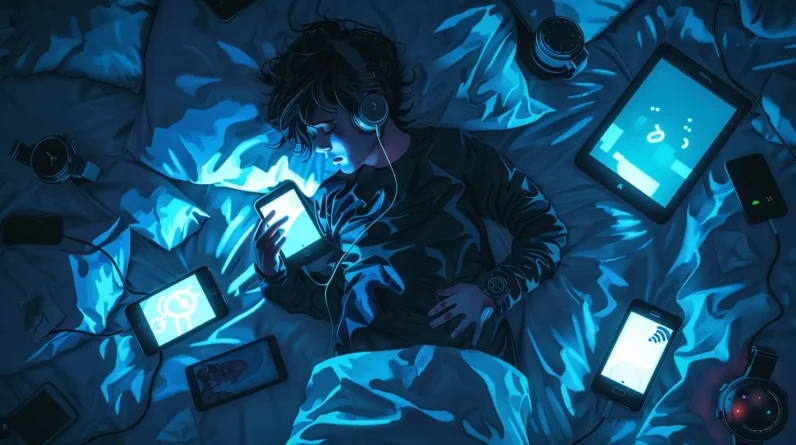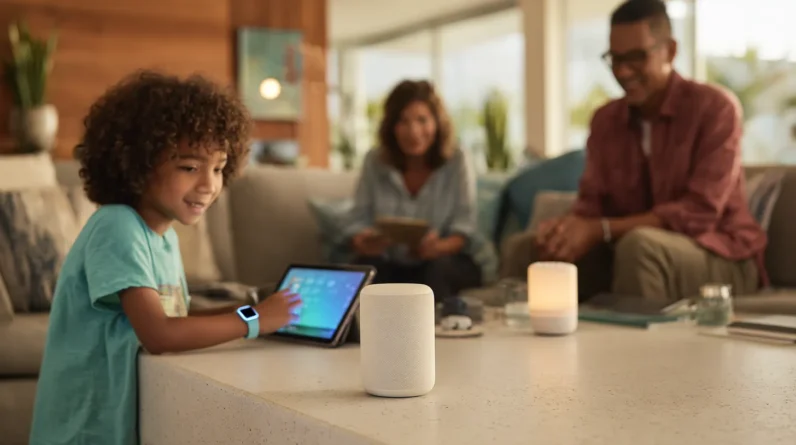
In our modern world, the convenience and connectedness brought by smart devices are undeniable. However, have you ever considered the potential impact they might have on our sleep patterns? The blue light emitted by screens, the disruption of our circadian rhythm, and the interference with melatonin production are just a few ways these devices could be affecting our rest. As we explore the effects of smart devices on our sleep, we might uncover surprising insights that could help us achieve a more restful night’s sleep.
Impact of Blue Light Emission
Analyzing the effects of blue light emission from smart devices reveals a notable disruption in normal sleep patterns. Blue light, with its short wavelength and high energy, inhibits the production of melatonin, a hormone that regulates sleep-wake cycles. Studies show that exposure to blue light in the evening suppresses melatonin levels, leading to difficulties falling asleep and reduced sleep quality. The impact of blue light on sleep architecture is profound, affecting both the duration and quality of restorative sleep.
This disruption can have long-term consequences on overall health and cognitive function. To mitigate these effects, limiting blue light exposure before bedtime and using devices with built-in blue light filters are recommended strategies to help maintain healthy sleep patterns.
Disruption of Circadian Rhythm
Exposure to blue light from smart devices not only disrupts melatonin production but also significantly impacts the circadian rhythm, the body’s internal clock regulating the sleep-wake cycle. Blue light exposure in the evening delays the release of melatonin, leading to a shift in the circadian rhythm towards a later schedule. This delay can result in difficulty falling asleep at the desired bedtime, ultimately affecting the overall quality and duration of sleep.
Research suggests that the suppression of melatonin due to blue light exposure disrupts the synchronization between the internal body clock and the external light-dark cycle, further exacerbating circadian rhythm disturbances. Therefore, minimizing blue light exposure from smart devices before bedtime is crucial in maintaining a healthy circadian rhythm and promoting restful sleep.
Influence on Melatonin Production
Minimizing blue light exposure from smart devices in the evening is crucial for maintaining healthy melatonin production, which plays a vital role in regulating the sleep-wake cycle. Melatonin, often referred to as the “sleep hormone,” is primarily produced by the pineal gland in response to darkness. Exposure to blue light emitted by screens in the evening can suppress melatonin production, leading to difficulty falling asleep.
Research indicates that even short exposure to this type of light can have a significant impact on melatonin levels. By understanding the link between smart device usage and melatonin disruption, individuals can make informed decisions to protect their natural sleep-wake cycle and overall well-being.
Effects on Sleep Quality
Our study reveals a significant correlation between prolonged smart device usage before bedtime and decreased sleep quality among participants. The blue light emitted by screens suppresses melatonin production, disrupting the circadian rhythm and leading to difficulties falling asleep. This effect is exacerbated by engaging with stimulating content that keeps the mind active, further delaying the onset of sleep. Poor sleep quality is evident in reduced REM and deep sleep stages, impacting cognitive function and overall well-being.
The data collected demonstrates a clear link between the duration of pre-sleep screen exposure and the subjective perception of sleep quality. To improve sleep quality, it is crucial to limit smart device usage before bedtime and establish a bedtime routine conducive to restful sleep.
Strategies for Better Sleep
Research suggests that implementing consistent sleep-wake schedules and creating a conducive sleep environment can significantly enhance overall sleep quality and duration. Maintaining a regular bedtime and wake-up time helps regulate the body’s internal clock, promoting better sleep patterns. Additionally, optimizing the sleep environment by ensuring a cool, dark, and quiet room can further improve sleep quality. Avoiding stimulants like caffeine and electronic devices before bedtime is crucial as they can disrupt the natural sleep cycle.
Engaging in relaxation techniques such as deep breathing exercises or meditation can also promote better sleep. These strategies, supported by scientific evidence, play a vital role in improving sleep hygiene and fostering optimal restorative sleep, essential for overall health and well-being.
Conclusion
The pervasive presence of smart devices in our lives symbolizes a double-edged sword. While they offer convenience and connectivity, their impact on our sleep patterns cannot be ignored. The data clearly shows that the blue light emission disrupts our circadian rhythm, affects melatonin production, and ultimately impairs our sleep quality. It is imperative that we implement strategies to minimize the negative effects of smart devices on our sleep for a healthier and more restful night.







